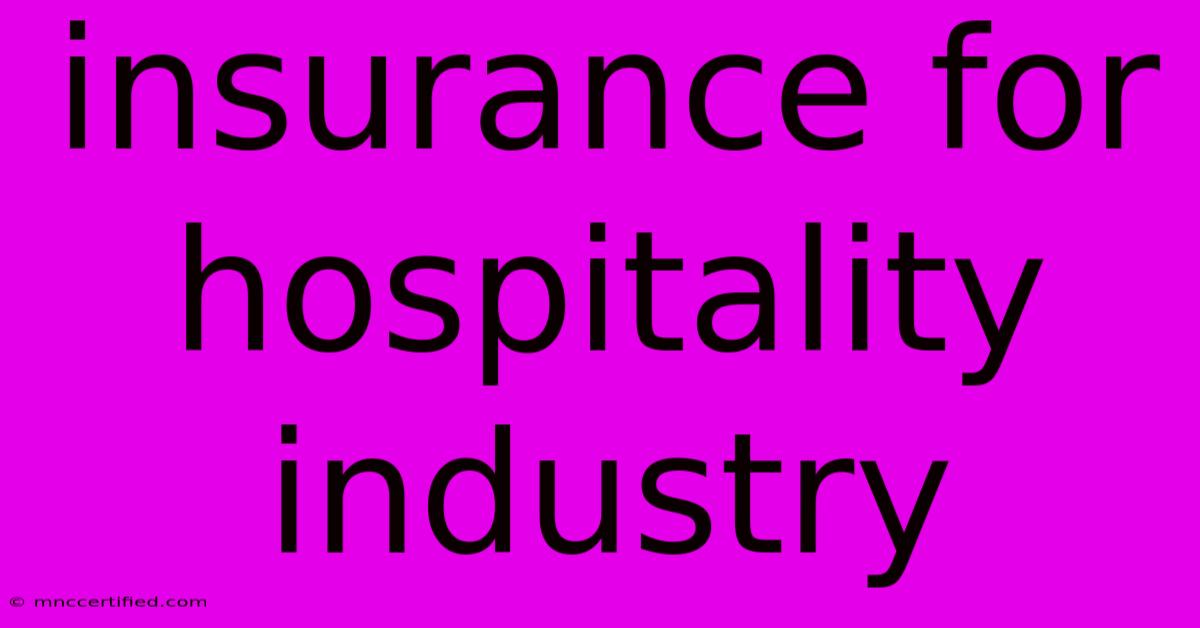Insurance For Hospitality Industry

Table of Contents
Insurance for the Hospitality Industry: A Comprehensive Guide
The hospitality industry, encompassing hotels, restaurants, bars, event venues, and more, faces unique risks. Protecting your business requires a comprehensive insurance strategy. This guide explores the essential insurance types for hospitality businesses, helping you navigate the complexities and secure the right coverage.
Key Risks in the Hospitality Industry
Before diving into specific insurance policies, understanding the common risks is crucial. These include:
- Liability Claims: Slip-and-falls, food poisoning, property damage, and even allegations of negligence can lead to costly lawsuits. This is arguably the most significant risk for hospitality businesses.
- Property Damage: Fires, floods, vandalism, and theft can cause extensive damage to your building, equipment, and inventory. The recovery process can be lengthy and expensive without adequate insurance.
- Business Interruption: An unforeseen event—like a fire or a major storm—can force you to close temporarily. This can severely impact your revenue, requiring insurance to cover lost income.
- Employee Injuries: Workplace accidents, whether minor or severe, can result in workers' compensation claims. Ensuring you have the right coverage is vital for both legal and ethical reasons.
- Cybersecurity Breaches: With increasing reliance on technology, data breaches can expose sensitive customer information, leading to significant financial losses and reputational damage.
Essential Insurance Policies for Hospitality Businesses
Choosing the right insurance policies is paramount. Here are some key types of insurance every hospitality business should consider:
1. General Liability Insurance: The Foundation
This is the cornerstone of hospitality insurance. General liability insurance protects your business from financial losses due to third-party bodily injury or property damage claims. This covers incidents happening on your premises or resulting from your business operations. It’s crucial for mitigating the risks associated with customer accidents and lawsuits.
2. Property Insurance: Protecting Your Assets
Property insurance covers physical damage to your building and its contents, such as furniture, equipment, and inventory. This protection extends to damage caused by various perils, including fire, theft, vandalism, and natural disasters. Tailor your policy to accurately reflect the value of your assets.
3. Business Interruption Insurance: Bridging the Gap
Business interruption insurance compensates for lost income and ongoing expenses during a period of closure due to a covered event, such as a fire or a natural disaster. This policy helps maintain financial stability while your business recovers from a setback.
4. Workers' Compensation Insurance: Protecting Your Employees
This policy is legally mandated in most jurisdictions. Workers' compensation insurance covers medical expenses and lost wages for employees injured on the job. It safeguards your business from potential lawsuits and maintains a positive work environment.
5. Liquor Liability Insurance (If Applicable): Managing Alcohol-Related Risks
If you serve alcohol, liquor liability insurance is essential. It protects your business from liability claims arising from alcohol-related incidents, such as drunk driving accidents or injuries caused by intoxicated patrons.
6. Cyber Liability Insurance: Safeguarding Digital Assets
In today's digital world, cyber liability insurance is increasingly important. It protects your business from financial losses resulting from data breaches, cyberattacks, and other cybersecurity incidents. This includes costs associated with notifying affected individuals, legal fees, and credit monitoring services.
Choosing the Right Insurance Provider
Selecting the right insurance provider involves careful consideration of factors such as:
- Coverage: Ensure the policy adequately covers your specific risks and needs.
- Premiums: Compare premiums from different providers to find the best value for your money.
- Reputation: Choose a reputable and financially stable insurer with a proven track record.
- Customer Service: Select a provider with responsive and helpful customer service.
Conclusion: Protecting Your Hospitality Business
Investing in the right insurance is not an expense; it's a crucial investment in your business's future. By understanding the unique risks of the hospitality industry and choosing appropriate coverage, you can protect your assets, your employees, and your reputation, ensuring the long-term success and stability of your business. Remember to regularly review your insurance policies to ensure they remain relevant and adequate to your evolving needs.

Thank you for visiting our website wich cover about Insurance For Hospitality Industry. We hope the information provided has been useful to you. Feel free to contact us if you have any questions or need further assistance. See you next time and dont miss to bookmark.
Featured Posts
-
Rare Tumor Davina Mc Calls Surgery
Nov 16, 2024
-
Jazz Beat Mavericks Collins Game Winning Dunk
Nov 16, 2024
-
Denmark Vs Spain Match Uefa Nations League
Nov 16, 2024
-
Wicked Star Erivos Outsider Story
Nov 16, 2024
-
Lenny Rush Life Off Screen
Nov 16, 2024